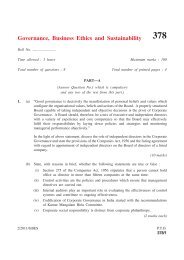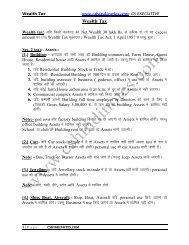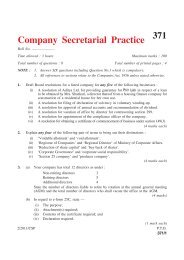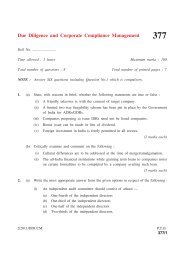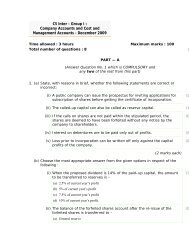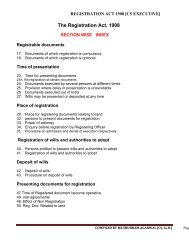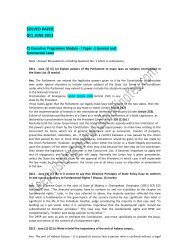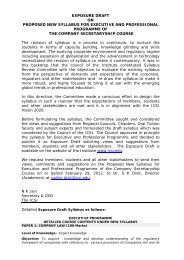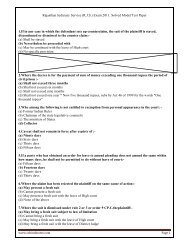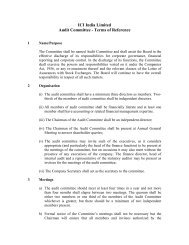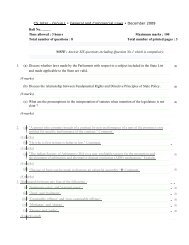CS EXECUTIVE SOLVED PAPER GCL GENERAL AND ... - cs notes
CS EXECUTIVE SOLVED PAPER GCL GENERAL AND ... - cs notes
CS EXECUTIVE SOLVED PAPER GCL GENERAL AND ... - cs notes
Create successful ePaper yourself
Turn your PDF publications into a flip-book with our unique Google optimized e-Paper software.
<strong>CS</strong> <strong>EXECUTIVE</strong> <strong>SOLVED</strong> <strong>PAPER</strong><br />
<strong>GCL</strong><br />
-The President can make ordinances on any item on which the Parliament can legislate,but is<br />
currently unable to do so.<br />
-Such ordinances will be temporary in effect, and they have to be placed before the Parliament<br />
when it is next in session.<br />
Ordinance making power of the Governor of a state as provided in the Constitution of India<br />
Under Article 213 the Governor has the power to make ordinances for a state when the<br />
house or houses of the state re not in session and it is essential to make a law. This is a part<br />
of the legislative powers given to the governor under the Constitution of India.<br />
The following important points in this regard have to be kept in mind –<br />
-This power can be utilized in cases of exigency.<br />
-If there is a normal route to make the law available it must be followed.<br />
-It can only be used to make laws that can be passed without the sanction of the President. -The<br />
ordinance would only have temporary powers, and will have to be laid down before the houses<br />
when they are next in session.<br />
This power will be used when both the houses or one house is not in session and it is not possible to<br />
make a law with the one house in session.<br />
Chapter - 2 : Interpretation of Statutes<br />
2010 - Dec [1] {C} (c)<br />
“Rule of ejusdem generis is merely a rule of construction to aid the courts<br />
to find out the true intention of the legislature.” Explain.(6 marks)<br />
Answer :<br />
Rule of Ejusdem Generis - It is one of the basic principles of interpretation. The term itself<br />
means ‘of the same kind’, and helps when the statute is not clear as to the implications and<br />
coverage. The rule says that when there is a specific class or classes of acts or things or persons<br />
defined in an Act, any word occurring subsequently will be bound by their coverage, i.e. a wider<br />
meaning than the one defined cannot be taken. For example, under the Central Excise Tariff Act,<br />
there are lists of items that come under the same head. If one of the lists say that it is to include<br />
textile articles, viz, clothing, sheets, bed covers, etc., it can in no way be inclusive of articles that<br />
cannot be termed strictly as being made of textile, like sheets made majorly of a synthetic fibre,<br />
though containing a small percentage of cotton fibre. Hence, if the list is an exhaustive or fairly<br />
indicative list, a wider meaning cannot be given to it.<br />
If, however, there is no specific list, or the class is not that well defined, the application<br />
could cover a wider scope. The universal logic behind this principle is that if a statute had been<br />
intended for a general coverage, it would not have included specific words to define the scope<br />
of its usage. It is essential though, that this rule should be used with discretion, because there<br />
exists the practical risk of the act becoming too specific for actual use.<br />
Keep visiting www.<strong>cs</strong>hindi<strong>notes</strong>.com Page 2


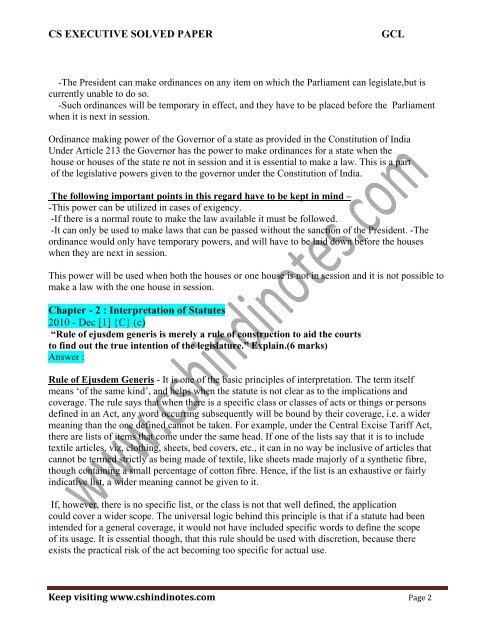
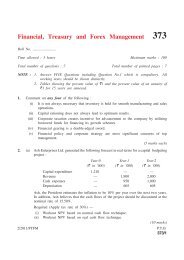

![vf/kfu;e dk vFkZ 'fu.kZ;' [ Interpretation of Statues ] Statue ... - cs notes](https://img.yumpu.com/38855798/1/190x245/vf-kfue-dk-vfkz-fukz-interpretation-of-statues-statue-cs-notes.jpg?quality=85)
